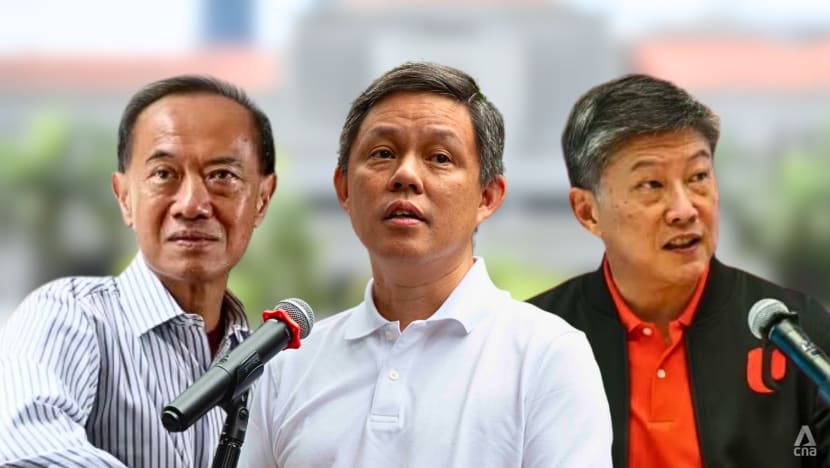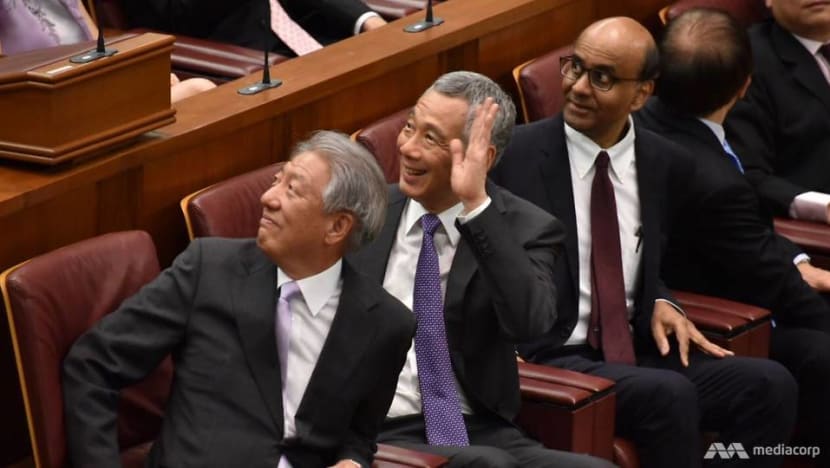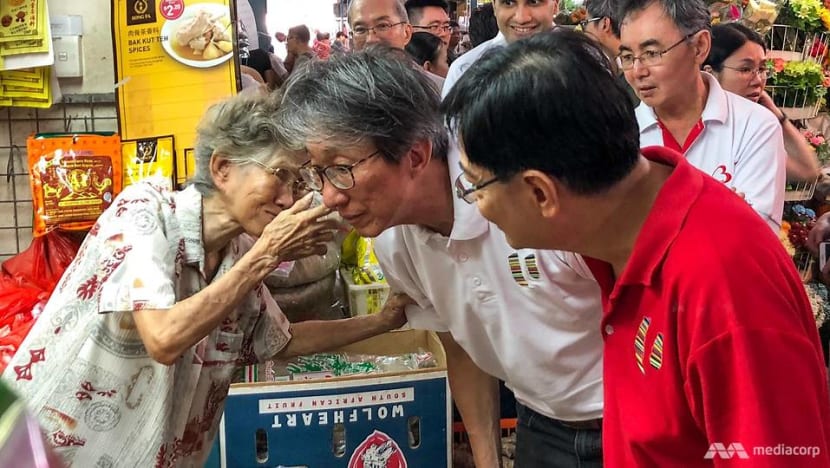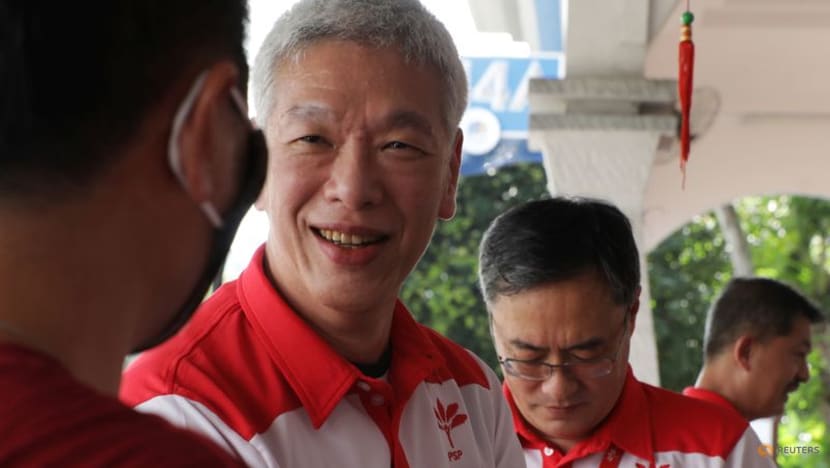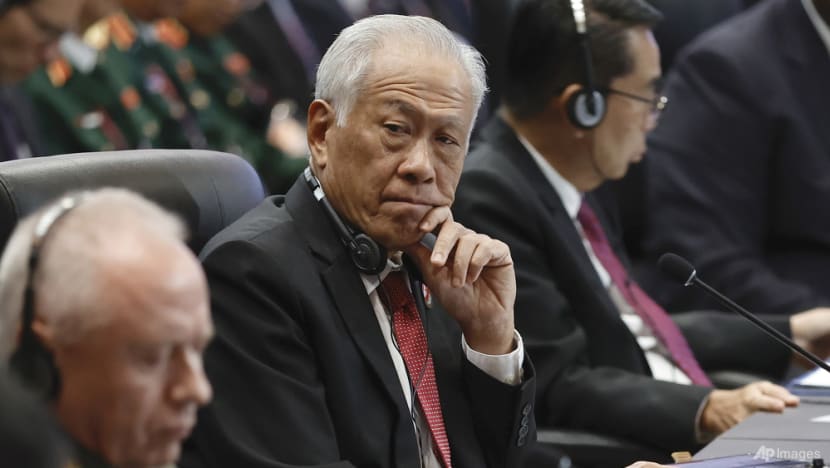GE2025: Military officers bring leadership to political arena but have to learn ground dynamics, say analysts
There have been historically close links between Singapore’s military and its ruling party, with senior officers continuing to serve in public life after retiring, said experts.
(from left) Former Foreign Minister George Yeo, Education Minister Chan Chun Sing and labour chief Ng Chee Meng, were all generals in the military before joining politics. (Photos: CNA/Syamil Sapari, TODAY/Nuria Ling, CNA/Lim Li Ting, NTUC)
SINGAPORE: Earlier in March, Singapore’s Chief of Army handed over command to his successor.
It’s a routine move that takes place every few years – except the timing has fuelled murmurings that Major-General David Neo could resign from service, enter politics and contest the imminent General Election (GE2025).
Back
when the change was announced in late February, the defence ministry said MG Neo would remain in MINDEF “to complete transition and other administrative matters”. CNA has contacted him for comment.
He would not be the first senior military officer to walk that path, with the ruling People’s Action Party (PAP) in particular having long sourced political talent from the Singapore Armed Forces (SAF).
At the last election in 2020, former brigadier-generals Gan Siow Huang and Desmond Tan were fielded as PAP candidates, and have since become political office holders.
Labour chief and former minister Ng Chee Meng’s Sengkang GRC team lost to the Workers’ Party at that same polls. Five years prior, Mr Ng had resigned as Chief of Defence Force to contest GE2015, and won as part of the PAP's Pasir Ris-Punggol team.
He was
spotted at a community event in the new Jalan Kayu SMC on Mar 16, as well as the week before at a Meet-The-People Session also in the area – leading to speculation he could run for the single-seat ward in elections expected to take place in the coming months.
Former military officers-turned-lawmakers told CNA that attributes picked up from soldiering, such as leadership, adaptability and the ability to operate under pressure, served them well in the political arena.
Yet observers noted that such individuals have also had to acclimatise to the less hierarchical setting of civilian life, while quickly getting to grips with parliamentary processes, grassroots structures and being in touch with the ground.
THE MILITARY AND THE STATE
Former minister and brigadier-general George Yeo told CNA that in Singapore, defence remains “inseparable” from statehood and independence – a dynamic unchanged since the 1990s. The SAF and National Service (NS) are thus core institutions of the country.
Observers noted the historically close links between Singapore’s military and its ruling party.
“The first generation of leaders like Lee Kuan Yew and Goh Keng Swee started governing Singapore at a time when coups were very rampant in post-colonial societies in Southeast Asia, Latin America and Africa,” said Dr Terence Lee, senior fellow at the S Rajaratnam School of International Studies (RSIS) think-tank.
To ensure stable civil-military relations in newly independent Singapore, the leadership made sure there was civilian control over the military, by not making the armed forces an organisation isolated from the wider population.
“In certain countries, the armed forces see themselves as separate and different from society,” said Dr Lee, who specialises in the study of civil-military relations.
For instance, officers in the United States, Thailand, Philippines and Indonesia train at specialised, degree-granting institutions devoted to inculcating a strong military ethos and a deep sense of esprit de corps.
In Singapore, however, men and women training to be officers also pick up professional and technical expertise on top of soldiering skills.
And after retiring from the SAF, it is “common” for them to continue serving in public life, said Dr Lee.
National University of Singapore associate professor of political science Bilveer Singh said the transition from senior military officer to politics has been “viable and encouraged” since the 1980s.
He cited early examples such as current Senior Ministers Lee Hsien Loong and Teo Chee Hean as well as Mr Yeo, who were all given scholarships by the SAF.
Senior Ministers Teo Chee Hean and Lee Hsien Loong and President Tharman Shanmugaratnam pictured in 2018 at the opening of the second session of the 13th Parliament. (File photo: Jeremy Long)
The latter wrote in his biography that SAF scholarships were not just an “HR (human resource) scheme to recruit talent” but an integral part of state formation in Singapore.
“The meritocracy was proven in their pathway to the scholarship. The notion was that because of merit, these guys are among the creme de la creme of society,” said Assoc Prof Singh.
“And in the Singapore context, being a small place, it doesn't mean that once you’re in the military, you’re forever in the military. You can be deployed for the greater good of society, which means in politics and the civil service.”
Ex-military officers in parliament
SM Lee was a former brigadier-general who left the army for politics in 1984. In late 1990, he became deputy prime minister, and in 2004 he took over as Singapore’s third prime minister. He stepped down last year after 20 years at the helm.
SM Teo was a former two-star rear-admiral and Chief of Navy, before joining politics in 1992. By 1995, he was a political office holder; and became a full minister the next year. He is currently also Coordinating Minister for National Security.
Former major-general and Chief of Army Chan Chun Sing resigned from the military and entered politics in 2011. He was made Acting Minister for Community Development, Youth and Sports immediately after the polls that year. By September 2013, he was a full minister.
Other current political office holders include Singapore’s first female general Gan Siow Huang, who was a brigadier-general in the air force until her political debut in 2020. She was made minister of state after that election.
Another former brigadier-general is Senior Minister of State Desmond Tan. He left the SAF after 28 years, becoming chief executive director of the People’s Association from 2017 to 2020, before entering politics. He was made a Minister of State after the election, and promoted in May last year.
Prominent names in the past include Mr Yeo who entered politics in 1988 after resigning as brigadier-general in the military. He went on to helm various ministries including health, trade and industry and foreign affairs, before exiting politics in 2011 after his team lost in Aljunied GRC.
Ambassador to the United States Lui Tuck Yew is also a former two-star rear-admiral and Chief of Navy who was a full minister from 2010 to 2015 before he stepped down from politics.
Then there’s former parliament Speaker Tan Chuan-Jin, an army brigadier-general before joining politics in 2011. He was a full minister from 2014 to 2017, before becoming Speaker. He resigned in 2023 over an extramarital affair.
Apart from the highest echelons of the military, there have been several senior officers who also made the transition to politics.
Former fighter pilot Shawn Huang spent 19 years in the air force and rose to lieutenant-colonel, before leaving for Temasek International ahead of the 2020 polls. In May last year, he was appointed Senior Parliamentary Secretary.
Among the current backbenchers, South East District Mayor Mohd Fahmi Aliman was an army colonel who served in the SAF for 26 years. He left in 2019, joining the Islamic Religious Council of Singapore (MUIS) and then the National Trades Union Congress, before contesting the 2020 general election.


